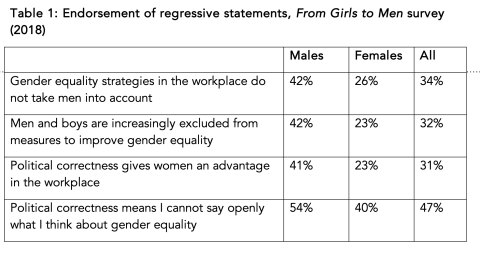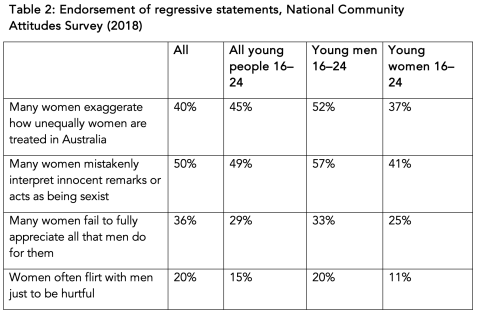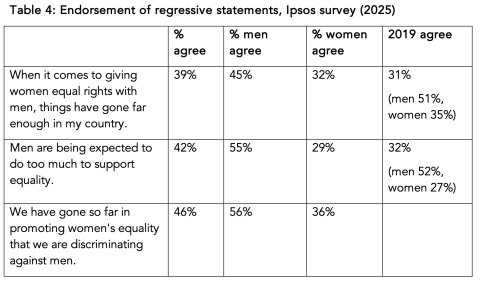




To what extent do people in Australia have anti-feminist attitudes? A number of Australian surveys support the point that significant proportions of the population endorse anti-feminist beliefs that men are treated unfairly or discriminated against.
The following summarises five sources of data on attitudes in Australia. Text on the first three sources is taken and revised from Masculinities and health: Attitudes towards men and masculinities in Australia (Flood, 2020). See pp. 26-30 for the original text.
For data on the proportions of women and men who identify as feminist, see here.
VicHealth survey, 2020
VicHealth commissioned an online, nationally representative survey with a sample of 1,619 respondents drawn from a panel and weighted to be representative of the Australian population by age, state and gender (Flood, 2020).
In the following account of the survey results, ‘net agreement’ is comprised of agreement minus disagreement. It may be positive, signalling net agreement (where more people agree than disagree) or negative, signalling net disagreement (where more people disagree than agree). For example, if 60% agree with a statement and 40% disagree, then net agreement will be 20%. On the other hand, if 40% agree and 60% disagree, then net agreement will be -20%. The report also uses the term ‘overall agreement’ as synonymous with net agreement. References to proportions agreeing with a particular statement refer to the sum of the proportions responding with either “Agree” or “Strongly agree”.
The 2020 VicHealth survey included four statements framed in anti-feminist terms:
- “The focus these days on harmful masculinity is part of a feminist war on men.”
- “Criticising masculinity is unfair because most men are good and decent.”
- “Men are being lectured too much about toxic masculinity.”
- “Traditional masculine qualities have served society well.”
Survey respondents showed overall agreement with all four statements. Levels of net agreement vary from lows of 7.6% and 13.2%, for the first and fourth statements above respectively, to 17.2% for the third statement, to 47.6% for the second one. Thus, while there is net agreement with all four statements, this is weakest for the notion of a “feminist war on men” and strongest for the notion of most men as “good and decent”.
Taking the first statement, there is substantial, although minority, direct agreement with the notion of a “feminist war on men”. Respondents show net agreement, although at a low level (7.6%). This is because about one-third of the population (34.3%) agree, another third (38.8%) are unsure, and only one-quarter (26.8%) disagree. Men in general shower higher agreement, for example with 41.3% agreeing and net agreement of 21.2%, whereas women overall disagree, with net agreement at -6.5%.
The notion of a feminist attack on men overlaps with the notion that men in general, or masculinity, are being unfairly criticised or tarnished, and this is the focus of the second statement above. There is net agreement (47.6%) that “Criticising masculinity is unfair because most men are good and decent.” Over half of respondents (58.9%) agree with the statement, and 29.8% are unsure or don’t know. Young women’s level of agreement that “Criticising masculinity is unfair because most men are good and decent” is particularly low, with 38.8% agreeing but about the same proportion (37.5%) unsure, and thus net agreement at only 15%. Young men are much more supportive of the statement, with net agreement at 40.6%, and 54.9% agreeing.
There is also net agreement (17.2%) with the third statement above, that “Men are being lectured too much about toxic masculinity.” Close to half of men (48.6%) agree, as do close to one-third (30.2%) of women. Males, both those under 18 and adult men, overall agree with the statement at similar levels, with agreement at 50.3% and 48.6% respectively, whereas only 30.2% of adult women and 27.5% of young women agree.
Net agreement that “Traditional masculine qualities have served society well” is not quite as low as for the first statement above, but still relatively visible at 13.2%. As with the previous statement, both adult and young men tend to agree with this statement, a lower proportion of adult women do so, and few young women agree. Levels of agreement with the statement for these four groups are at 43.8%, 41.3%, 30.2%, and 21.9% respectively.
From Girls to Men, 2018
From Girls to Men: Social Attitudes to Gender Equality Issues in Australia is a national survey in March 2018 of 2,122 Australians 16 and above (Evans et al., 2018).
From Girls to Men included a number of statements offering a regressive or opposition framing of men and gender (Evans et al., 2018), shown in Table 1. Note that the first two statements in the table are somewhat ambiguous: agreement could reflect an anti-feminist concern about discrimination and injustice suffered by men, or a feminist concern that men’s potential roles in building gender equality are being neglected.
See Table 1.
The From Girls to Men survey also documents generational differences in support for these and other statements about gender. Among males for example, there were uneven relationships between support and age. Millennial males (in their mid-20s to late 30s) and Builder males (aged 73+) showed the highest levels of agreement that “Gender equality strategies in the workplace do not take men into account”, at 45%, compared to 38% of Gen Z males (aged 16-23) and 39% of Gen X men (aged 39-53) (Evans et al., 2018, p. 43). Asked whether “Men and boys are increasingly excluded from measures to improve gender equality,” again, Millennial men (in their mid-20s to late 30s) were significantly more likely (48%) to agree or strongly agree, but this time followed by Gen Z males (aged 16-23) at 44% (Evans et al., 2018, p. 43).
National Community Attitudes Survey, 2018
The National Community Attitudes Survey (NCAS) is a national survey of 17,500 Australians aged 16 years and over. It includes questions focused on attitudes towards gender, alongside a large variety of questions on domestic and sexual violence.
The NCAS survey (2018) found that substantial proportions of the population endorse statements suggesting a general hostility towards or criticism of women and women’s efforts to gain equality, as Table 2 shows.
All four statements above are instances of what some have called ‘modern sexism’ or ‘neosexism’, characterised by a denial of discrimination against women and resentment of complaints about sexism and efforts to assist women (Becker & Sibley, 2016, p. 319). The first of these statements suggests that women deliberately exaggerate the extent of gender inequality, and 40% of Australians agree. The second statement allows that women simply make mistakes in naming sexism, and half agree. The last represents a view of women as malicious towards men, and one in five people in Australia agree.
These forms of sexist denial and resentment are, predictably, more common among men that women. Among young people in Australia, young men were significantly more likely than young women to agree with each of the four statements (Politoff et al., 2019, p. 22). (Gender breakdowns for each statement for the entire sample are not available.)
National Community Attitudes Survey, 2021
A more recent round of the National Community Attitudes Survey (NCAS) was conducted in 2021, and published in 2023 (Coumarelos et al., 2023).
See Table 3.
Ipsos survey (Australian findings), 2025
Ipsos conducted a 30-country survey over December 2024 to January 2025 among 23,765 adults aged 18 years and older (Ipsos, 2025). The following focuses on the Australian data, based on 1,000 people, and focusing on statements associated with anti-feminist sentiment.
See Tables 4 and 5.
The previous year’s Ipsos survey (2024) compares younger and older generations, finding that on average across 31 countries, younger generations (Millenials and Gen Z) have more conservative attitudes on some items, including some of the statements above (Ipsos, 2024, pp. 11-13).
Other data sources
Further sources for data on gender-related attitudes in Australia include:
- The Man Box surveys conducted in 2018 and 2023 (The Men’s Project & Flood, 2018, 2020, 2024)
- Plan International’s “Gender Compass” report (2023)
References
Becker, J. C., & Sibley, C. G. (2016). Sexism. In T. D. Nelson (Ed.), Handbook of Prejudice, Stereotyping, and Discrimination (2nd edition ed., pp. 315-336). Psychology Press.
Coumarelos, C., Weeks, N., Bernstein, S., Roberts, N., Honey, N., Minter, K., & Carlisle, E. (2023). Attitudes matter: The 2021 National Community Attitudes towards Violence against Women Survey (NCAS), Findings for Australia.
Evans, M., Haussegger, V., Halupka, M., & Rowe, P. (2018). From Girls to Men: social attitudes to gender equality issues in Australia. 50/50 by 2030 Foundation (University of Canberra).
Flood, M. (2020). Masculinities and Health: Attitudes towards men and masculinities in Australia.
Ipsos. (2024). International Women’s Day 2024: Global attitudes towards women’s leadership.
Ipsos. (2025). International Women’s Day 2025.
Politoff, V., Crabbe, M., Honey, N., Mannix, S., Mickle, J., Morgan, J., Parkes, A., Powell, A., Stubbs, J., & Ward, A. (2019). Young Australians’ attitudes to violence against women and gender equality: Findings from the 2017 National Community Attitudes towards Violence against Women Survey (NCAS) (ANROWS Insights, Issue.
The Men’s Project, & Flood, M. (2018). The Man Box: A Study on Being a Young Man in Australia. Jesuit Social Services.
The Men’s Project, & Flood, M. (2020). Unpacking the Man Box: What is the impact of the Man Box attitudes on young Australian men’s behaviours and well-being? Jesuit Social Services. https://jss.org.au/what-we-do/the-mens-project/the-man-box/
The Men’s Project, & Flood, M. (2024). The Man Box 2024: Re-examining what it means to be a man in Australia.